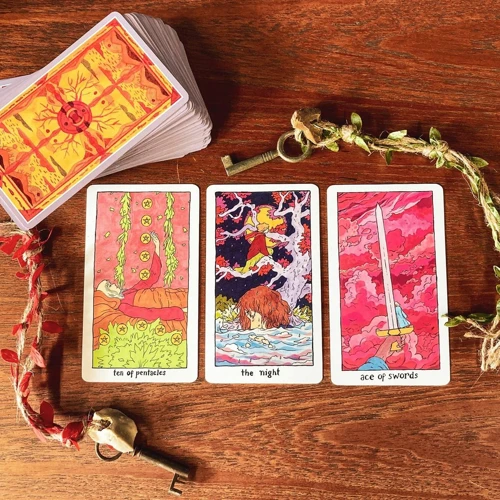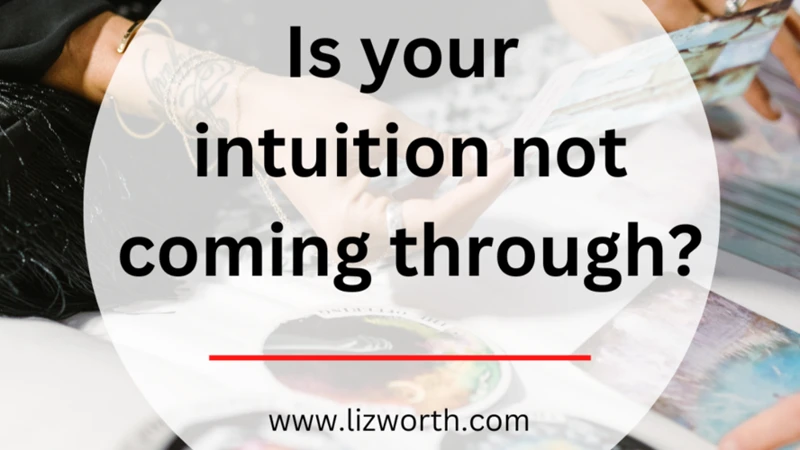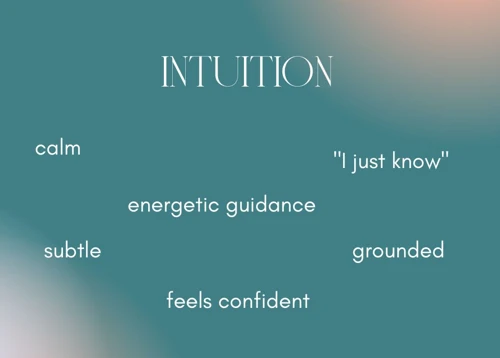Have you ever experienced a strong gut feeling or a sudden inspiration that led you to make a life-changing decision? If so, you may have been tapping into your intuition, a powerful and often misunderstood sense that exists within all of us. Intuition is the ability to understand something instinctively, without the need for conscious reasoning. It’s like having a built-in compass that guides you towards what feels right and authentic. In this article, we will explore the signs that your intuition is trying to communicate with you, how to recognize these signs, and ways to develop and strengthen your intuitive abilities. So, get ready to unlock the hidden potential of your inner voice and embark on a journey of self-discovery.
Contents
- What Is Intuition?
- Why Is Intuition Important?
- Signs That Your Intuition Is Trying to Communicate with You
- How to Recognize Intuitive Signs
- Developing Your Intuition
- Conclusion
-
Frequently Asked Questions
- 1. How can I differentiate between intuition and fear?
- 2. Can everyone develop their intuition?
- 3. How can I quiet my mind to listen to my intuition?
- 4. Can intuition guide me in making important life decisions?
- 5. Are there any exercises I can do to strengthen my intuition?
- 6. Can dreams be a form of intuition?
- 7. Is it possible for intuition to guide me in my career choices?
- 8. Will my intuition always lead me in the right direction?
- 9. Can intuition help me in my relationships?
- 10. How can I know if I’m interpreting my intuition correctly?
- References
What Is Intuition?

Intuition is a natural and innate ability that we all possess. It can be described as a deep knowing or understanding about something, even without having any logical or rational explanation. It is often referred to as our “sixth sense” or “gut feeling,” and it operates beyond the realm of conscious thought. Intuition allows us to tap into a higher level of awareness, enabling us to make decisions and navigate through life based on our inner guidance system. It is not limited to any specific sense, but rather a combination of our thoughts, emotions, and physical sensations. Intuitive information can come in various forms, such as sudden insights or inspiration, vivid dreams, or even physical sensations like a “tight” feeling in the gut or goosebumps. It is important to note that intuition is different from psychic abilities, which involve perceiving information beyond the five senses. If you want to learn more about the science behind developing intuition or how to cultivate your intuitive skills, check out our articles on science-based techniques for developing intuition and our comprehensive guide for beginners on cultivating intuition. Understanding and harnessing the power of intuition can greatly enhance decision-making, problem-solving, and overall well-being.
Why Is Intuition Important?

Intuition plays a vital role in our lives for several reasons. Firstly, it serves as a powerful inner compass that guides us towards making decisions that align with our authentic selves. It can help us navigate through complex situations, where logic and reasoning may fall short. Secondly, intuition acts as an early warning system, alerting us to potential dangers or pitfalls that our conscious mind may not yet be aware of. It can help us avoid making impulsive or harmful choices. Thirdly, intuition provides us with valuable insights and perspectives that go beyond conventional wisdom. It taps into our subconscious mind, which processes a vast amount of information that our conscious mind may not be able to access. This allows us to gain a deeper understanding of ourselves and the world around us. Trusting our intuition can lead to greater self-confidence and self-trust. It allows us to live in alignment with our true desires and values, leading to a more fulfilling and purpose-driven life. If you’re curious about the role of intuition in psychic readings, check out our article on how intuition plays a role in psychic readings. Understanding and honoring our intuition can have a profound impact on our personal growth, relationships, and overall well-being.
Signs That Your Intuition Is Trying to Communicate with You

Our intuition communicates with us in subtle ways, and recognizing the signs can help us tap into its wisdom and guidance. One of the signs that your intuition is trying to communicate with you is a strong “gut feeling” or instinct. This is that deep inner knowing that something is either right or wrong, without any logical explanation. Another sign is sudden inspiration or a burst of creative ideas that seem to come out of nowhere. It’s as if your intuition is whispering insights and possibilities into your mind. Pay attention to physical sensations as well, such as goosebumps, a tingling feeling, or a tightness in your chest. These sensations often indicate that your intuition is alerting you to something important. Coincidental encounters with certain people or situations can also be a sign from your intuition. These seemingly random events or encounters may hold deeper meaning or serve as synchronistic messages. Lastly, vivid dreams can be a powerful way for your intuition to communicate with you. Pay attention to recurring themes or symbols in your dreams, as they may hold valuable insights. Being aware of these signs can help you trust and act upon your intuitive guidance.
1. Gut Feeling
– A gut feeling is often described as a strong intuition or instinctive reaction that arises in the pit of your stomach. It’s that unexplainable sensation that something is either right or wrong. This intuitive signal can manifest as a physical tightening or fluttering in the stomach or a sense of unease or excitement. It’s important to pay attention to these sensations as they can serve as powerful guiding forces in decision-making.
– A gut feeling is typically accompanied by a sense of certainty, even without concrete evidence or logical reasoning. It’s like an internal knowing that transcends conscious thought. Trusting your gut can lead to making choices that align more closely with your authentic self and can often guide you away from potential negative situations.
– To recognize a gut feeling, it’s essential to cultivate self-awareness and tune into your bodily sensations. One effective way to do this is through mindfulness practices such as meditation. By quieting the mind and focusing on the present moment, you can enhance your sensitivity to these gut feelings.
– It’s vital to differentiate between a gut feeling and irrational fears or anxieties. Gut feelings are often based on deeper intuition and are not easily swayed by external influences or fears. They tend to be persistent and consistent, providing a sense of clarity and conviction.
– Developing trust in your gut feeling takes practice and self-reflection. Start by paying attention to times when you followed your intuition and it led to positive outcomes. Reflect on situations where you ignored your gut feeling and regretted it later. Over time, you will learn to trust these signals and rely on them as valuable sources of guidance in your life decisions.
2. Sudden Inspiration
Sudden inspiration is a common sign that your intuition is trying to communicate with you. It often feels like a burst of creative energy or a rush of ideas that come seemingly out of nowhere. You might be going about your daily routine when, suddenly, a new solution to a problem or a fresh perspective on a project enters your mind. This spark of inspiration can be powerful and exciting, and it’s important not to dismiss it as mere coincidence. When you experience sudden inspiration, pay attention to the thoughts and ideas that arise. They may hold valuable insights and potential directions for your life or work. It’s also worth noting that sudden inspiration doesn’t always come at convenient times – it can strike when you’re in the shower, taking a walk, or even just before falling asleep. Keeping a notebook or a journal handy can be helpful to capture these moments of inspiration before they slip away. So, the next time you are hit with a wave of sudden inspiration, embrace it and explore where it may lead you. It could be your intuition guiding you towards something truly meaningful and transformative.
3. Physical Sensations
Physical sensations can be strong indicators that your intuition is trying to communicate with you. These sensations can manifest in various ways, such as a tightness or fluttering sensation in your stomach, a tingling or prickling sensation on your skin, or a sudden chill or heat in your body. These physical sensations often occur when you are faced with decisions or situations that are significant or hold deeper meaning for you. Paying attention to these sensations can provide valuable insights into what path or course of action aligns with your true self. For example, if you experience a sense of unease or discomfort in your gut when considering a particular decision, this could be a sign that it is not the right choice for you. On the other hand, a warm and content feeling in your body might indicate that you are on the right track. It is important to note that these physical sensations are personal and can vary from individual to individual. It is crucial to develop self-awareness and mindfulness to recognize and interpret these signals accurately. Trusting and honoring these physical sensations can lead you to make choices that are in alignment with your authentic self and ultimately bring about greater fulfillment and happiness in your life.
4. Coincidental Encounters
Coincidental encounters can often be a strong sign that your intuition is trying to communicate with you. These encounters may involve seemingly random meetings or interactions with specific individuals who hold significant meaning or deliver important messages. It’s as if the universe conspires to bring these people into your life at the right moment. These encounters can be serendipitous, with the timing and circumstances aligning perfectly. You might bump into an old friend you were just thinking about or meet someone new who shares your interests and passions. These encounters can also happen through unexpected phone calls, emails, or social media messages from people you haven’t heard from in a long time. These synchronistic experiences can provide valuable insights, guidance, or connections that can help you on your path. It’s important to pay attention to these coincidences and reflect on their significance. Keeping a journal to record these encounters can help you identify patterns and gain a deeper understanding of their meaning. By recognizing and acknowledging these coincidences, you open yourself up to the messages and opportunities that your intuition is trying to convey. Trusting the process and remaining open to the signs that the universe presents will strengthen your intuitive abilities and lead you towards greater clarity and alignment.
5. Vivid Dreams
Vivid dreams can be a powerful way in which our intuition communicates with us. These dreams are often highly detailed, emotionally charged, and leave a lasting impression upon waking. They can provide insights, guidance, and even premonitions about future events. When we have vivid dreams, it is essential to pay attention to the symbols, images, and emotions that arise during the dream. Our intuition often speaks to us through metaphors and symbols, so analyzing the content of the dream can reveal hidden messages and meanings. It is useful to keep a dream journal next to your bed and jot down the details of your dreams as soon as you wake up. This will allow you to revisit and analyze them later on. Look for patterns or recurring themes in your dreams, as they may hold significant clues about your subconscious desires, fears, or intuitive insights. Discussing your dreams with a trusted friend or seeking guidance from a dream interpreter or therapist can provide further insights and interpretations. By honoring and exploring your vivid dreams, you create an opportunity to deepen your connection with your intuition and gain valuable information from the subconscious mind.
How to Recognize Intuitive Signs

Recognizing intuitive signs can be a powerful tool in harnessing the guidance of your intuition. Here are some ways in which you can become more attuned to these signs. Firstly, pay attention to your body. Notice any physical sensations or reactions that arise when faced with different choices or situations. This could be a feeling of unease in your gut or a sense of lightness and expansion. Secondly, listen to your inner voice. Take time to quiet your mind and tune in to the subtle whispers of your intuition. It may come in the form of a hunch, a sudden thought, or a clear knowing. Trusting and following this inner voice is crucial. Lastly, trust your instincts. Often, our intuition provides us with immediate and instinctive responses to certain situations. Trust these gut feelings and intuitive hits, even if they don’t seem to align with logical reasoning. By practicing these techniques and honing your awareness, you can establish a deep connection with your intuition and learn to recognize its signs more readily.
1. Pay Attention to Your Body
Paying attention to your body is a crucial step in recognizing intuitive signs and messages. Our bodies have a unique way of communicating with us, and tuning into these signals can provide valuable insights. Here are a few ways to pay attention to your body:
1. Gut Feelings: Pay close attention to the sensations in your gut or stomach area. This is the area where many people experience their intuition manifesting as a “gut feeling.” It may feel like a tightening or a knot in your stomach when something doesn’t feel right, or conversely, a lightness or expansion when something feels aligned and harmonious.
2. Physical Sensations: Notice any physical sensations that arise when you encounter a specific situation or make a decision. These sensations could manifest as tingling sensations, chills, or even a sense of warmth in certain parts of your body. Each person’s experience may vary, so it’s essential to be attuned to your unique physical responses.
3. Energy Shifts: Pay attention to any shifts in your overall energy levels. Your intuition may present itself as a sudden increase or decrease in energy. For example, you might feel a burst of excitement or enthusiasm when you’re on the right path, or perhaps a sense of tiredness or heaviness when something feels off.
4. Emotional Reactions: Take note of your emotional reactions to different situations or people. Your emotions can provide valuable information about your intuitive response. Pay attention to any sudden changes in mood or strong emotional reactions, as these can be indications that your intuition is trying to communicate something to you.
Remember, paying attention to your body requires presence and mindfulness. Take the time to pause, breathe, and tune in to the physical sensations and signals that arise. Developing this awareness will enable you to recognize and interpret your body’s intuitive messages more effectively.
2. Listen to Your Inner Voice
Listening to your inner voice is a crucial aspect of recognizing and harnessing your intuition. Our inner voice, also known as our inner wisdom or intuitive guidance, is the voice that speaks to us from deep within. It’s that small, quiet voice that often gets drowned out by the noise and distractions of everyday life. Here are some tips to help you better listen to your inner voice:
1. Create a Quiet Space: Find a quiet and peaceful environment where you can sit or lie down comfortably. This could be a designated meditation space, your bedroom, or even a park. The key is to be in a place where you can have some uninterrupted time to connect with your inner self.
2. Relax and Clear Your Mind: Take a few deep breaths and let go of any tension or stress you may be feeling. Clear your mind of any thoughts or worries by focusing on your breath or by practicing mindfulness techniques. This will help quiet the chatter in your mind and allow your inner voice to come forth.
3. Ask for Guidance: Pose a specific question or situation to your inner voice. Be clear and concise in your inquiry, and ask for guidance or insights. It could be a decision you’re facing, a problem you’re trying to solve, or simply asking for general guidance on your life path. Trust that your inner voice will respond in its own time and in its own way.
4. Trust the First Response: When you ask for guidance, your inner voice may provide an initial response or answer. This response may come in the form of a thought, a feeling, an image, or even a word. Trust that this first response is your intuition speaking to you. Avoid overanalyzing or second-guessing yourself.
5. Practice Active Listening: Actively listen to your inner voice throughout the day. Pay attention to any hunches, nudges, or subtle cues that come your way. Your intuition may speak to you through synchronicities, signs, or even encounters with certain people. Stay open and receptive to these messages.
Remember, developing a strong connection with your inner voice takes time and practice. Be patient with yourself and continue to cultivate a sense of curiosity and openness. By listening to your inner voice, you will gain valuable insights and guidance that can help you make better decisions and navigate through life with more clarity and purpose.
3. Trust Your Instincts
Trusting your instincts is a crucial aspect of recognizing and honoring your intuition. Instincts are our innate and automatic responses to certain situations or stimuli. They are deeply rooted in our subconscious and can provide valuable guidance when we learn to listen to them. Here are some tips on how to trust your instincts:
1. Pay attention to your body: Our bodies have a way of communicating with us on a visceral level. Notice any physical sensations that arise in certain situations or around certain people. A tightness in the chest or a knot in the stomach could be a sign that something doesn’t feel right. Trust these bodily cues as they can serve as important signals from your intuition.
2. Tune into your emotions: Emotions can be powerful indicators of our true feelings and desires. Notice how you feel when you’re presented with different choices or decisions. Do you experience a sense of ease and excitement, or do you feel a sense of unease or hesitation? Trusting your instincts means paying attention to these emotional responses and allowing them to guide you towards what feels right.
3. Reflect on past experiences: Take a moment to reflect on situations in the past where you may have ignored your instincts and later regretted it. On the other hand, think about instances where trusting your intuition led to positive outcomes. Use these experiences as evidence of the power of your instincts and use them to build trust in your inner guidance system.
4. Practice self-awareness: Developing self-awareness is key to trusting your instincts. Take time to tune into your thoughts, feelings, and sensations throughout the day. Notice any patterns or consistent signals that your body and mind may be sending you. The more you practice being present and aware, the easier it becomes to recognize and trust your instincts.
Remember, trusting your instincts is a skill that can be cultivated over time. It requires patience, self-reflection, and a willingness to let go of external influences and trust in your own inner wisdom. By learning to trust your instincts, you empower yourself to make decisions that align with your true self and lead to a more fulfilling life.
Developing Your Intuition
Developing your intuition is a continuous process that requires patience, practice, and self-awareness. One effective way to enhance your intuition is through meditation and mindfulness practices. These practices help calm the mind, increase self-awareness, and create a space for intuitive insights to arise. By quieting the constant chatter of the mind, you can better tune in to your inner voice and connect with your intuitive senses. Another helpful technique is journaling, which allows you to explore your thoughts, feelings, and intuitions on paper. Writing can provide clarity and help you recognize patterns or signs that may be guiding you. Trusting the process is also crucial in developing your intuition. Have faith in your own abilities and the messages that come through. Sometimes, the answers may not be immediate or obvious, but by trusting the process and staying open, you allow your intuition to grow and guide you on your journey of self-discovery.
1. Meditation and Mindfulness
Meditation and mindfulness practices are powerful tools for developing and strengthening your intuition. By quieting the mind and becoming more present in the moment, you create a space for your intuition to speak to you. Meditation involves focusing your attention and achieving a state of deep relaxation. This practice helps to calm the chatter of the mind, allowing you to access your inner wisdom and intuition. Mindfulness, on the other hand, involves being fully present and aware of your thoughts, emotions, and physical sensations in the present moment. It cultivates a sense of deep listening and receptivity to the subtle cues and messages that your intuition may be sending you. By incorporating regular meditation and mindfulness into your daily routine, you can develop a greater sense of self-awareness and attunement to your intuitive insights. These practices also help you to quiet the noise of external distractions and tap into your inner voice. As you engage in meditation and mindfulness, pay attention to any intuitive thoughts, feelings, or sensations that arise during or after your practice. Journaling about these experiences can be helpful in deepening your understanding of your intuition and the messages it may be trying to convey. So, set aside some time each day for meditation and mindfulness, and watch as your intuitive abilities flourish.
2. Journaling
Journaling is a powerful tool that can help you tap into your intuition and develop a deeper understanding of yourself. By regularly writing down your thoughts, feelings, and experiences, you create a space for self-reflection and introspection. Through journaling, you can access the wisdom and insights that your intuition has to offer. When you write, you engage both your logical mind and your intuitive mind, allowing for a harmonious integration of both. You can use your journal as a safe space to explore and express your thoughts and emotions without judgment. When it comes to journaling for intuition, there are various approaches you can take. One effective method is to pose open-ended questions or prompts to yourself and allow your intuition to guide your writing. For example, you can ask, “What is my intuition trying to tell me about this situation?” or “What do I need to pay attention to right now?” Trust the first thoughts or words that come to mind and let them flow onto the pages of your journal. Another technique is to write down your dreams and analyze the symbolism and messages they may hold. Dreams can be a powerful conduit for intuitive guidance. By capturing your dreams in your journal and reflecting on them, you can uncover hidden meanings, patterns, and insights that can inform your waking life. Remember to date your entries so that you can track your progress and see how your intuition evolves over time. So grab a journal and pen, and let your intuitive voice speak through the words on the page. Journaling can be a transformative practice that deepens your connection to your inner wisdom and helps you navigate life with greater clarity and purpose.
3. Trusting the Process
Trusting the process is an essential aspect of developing and strengthening your intuition. It involves surrendering control and allowing the intuitive guidance to unfold naturally. Here are some tips to help you trust the process:
1. Let go of expectations: When it comes to intuitive insights, it’s important to release any preconceived notions or expectations of how and when information should come to you. Trust that the right messages will reveal themselves at the perfect time.
2. Embrace uncertainty: Intuition often operates beyond the realm of certainty and logic. It may guide you in directions that seem unconventional or uncertain. Embracing the unknown and stepping out of your comfort zone will allow your intuition to thrive.
3. Practice patience: Developing your intuition is a gradual process that requires patience. It’s not something that can be mastered overnight. Trust that with time and practice, your intuitive abilities will strengthen and become more reliable.
4. Reflect on past experiences: Take the time to reflect on instances when you followed your intuition and it led you in the right direction. Remind yourself of these successes to build confidence in your ability to trust your intuitive guidance.
5. Cultivate self-trust: Trusting your intuition starts with trusting yourself. Believe in your own capabilities and wisdom. Recognize that you have the power to make intuitive decisions that align with your highest good.
Remember, intuition is a deeply personal and unique experience. Trusting the process is about honoring your own journey and allowing the intuitive wisdom to unfold naturally. By embracing uncertainty, cultivating patience, and reflecting on past experiences, you can develop a deeper trust in your intuitive abilities and navigate through life with greater clarity and confidence.
Conclusion
In conclusion, intuition is a powerful tool that can guide us in making decisions and navigating through life. It is a natural and innate ability that we all possess, allowing us to tap into a deeper level of awareness beyond logical reasoning. The signs that your intuition is trying to communicate with you can be subtle but impactful, such as gut feelings, sudden inspirations, physical sensations, coincidental encounters, and vivid dreams. By paying attention to our body, listening to our inner voice, and trusting our instincts, we can recognize and interpret the intuitive signs that come our way. Additionally, developing and strengthening our intuition is possible through practices like meditation and mindfulness, journaling, and trusting the process. Embracing our intuition can lead to more authentic and fulfilling lives. So, trust in your intuitive abilities, follow your inner compass, and embark on a journey of self-discovery.
Frequently Asked Questions
1. How can I differentiate between intuition and fear?
Distinguishing between intuition and fear can be challenging, as both can feel like strong gut feelings. However, intuition often carries a sense of calm and clarity, while fear tends to be accompanied by anxiety and unease. Intuition is a gentle nudge towards what feels right, whereas fear tends to hold us back out of a sense of danger or perceived risk.
2. Can everyone develop their intuition?
Yes, everyone has the innate ability to develop their intuition. Some may have a naturally stronger connection to their intuition, but with practice and awareness, anyone can cultivate their intuitive skills and strengthen their intuitive abilities.
3. How can I quiet my mind to listen to my intuition?
Meditation and mindfulness practices can be incredibly helpful in quieting the mind and creating space to listen to your intuition. Taking regular breaks, spending time in nature, or engaging in activities that bring you joy can also help calm the mind and enhance your ability to tune into your intuitive guidance.
4. Can intuition guide me in making important life decisions?
Absolutely! Intuition can be a valuable tool when it comes to making important life decisions. By tapping into your intuition, you can access your inner wisdom and gain insights that may not be apparent through rational thinking alone. Trusting your intuition can lead you towards choices that align with your authentic self and bring about positive outcomes.
5. Are there any exercises I can do to strengthen my intuition?
Yes, there are various exercises you can try to strengthen your intuition. Journaling can help you become more aware of your intuitive thoughts and feelings. Visualizations and guided imagery exercises can also enhance your intuitive abilities. Additionally, practicing self-reflection and trusting the process of life can foster a deeper connection with your intuition.
6. Can dreams be a form of intuition?
Absolutely! Dreams can be a powerful way for your intuition to communicate with you. Pay attention to recurring dreams, vivid dreams, or dreams that provide you with insights or solutions to problems. Journaling your dreams can help you decipher the messages your intuition is conveying while you sleep.
7. Is it possible for intuition to guide me in my career choices?
Yes, intuition can play a significant role in guiding career choices. Your intuition can guide you towards careers that align with your passions, values, and purpose. Pay attention to your feelings and inner guidance when considering different career paths, and trust that your intuition will lead you towards fulfilling and meaningful work.
8. Will my intuition always lead me in the right direction?
Intuition is a valuable tool, but it is not infallible. It’s important to remember that intuition provides guidance based on your inner knowing and current circumstances. Factors such as external influences, personal biases, and unforeseen variables can still impact outcomes. Trusting your intuition means recognizing that it is one piece of the decision-making puzzle and considering other relevant information as well.
9. Can intuition help me in my relationships?
Yes, intuition can be incredibly helpful in relationships. It can help you tune into your own needs and emotions, as well as understand the needs and emotions of others. Intuitive insights can provide guidance on navigating conflicts, making important decisions together, and fostering deeper connections with your loved ones.
10. How can I know if I’m interpreting my intuition correctly?
Interpreting your intuition correctly sometimes requires practice and self-reflection. One way to gain clarity is by testing your intuition in smaller, less significant matters and reflecting on the outcomes. Journaling your intuitive experiences and discussing them with trusted friends or mentors can also provide valuable insights and perspectives.







